Get Transaction History
1. getTransactionHistory.cs
These four packages are required to be used.

Step 1. Create class file to store content of the web response.
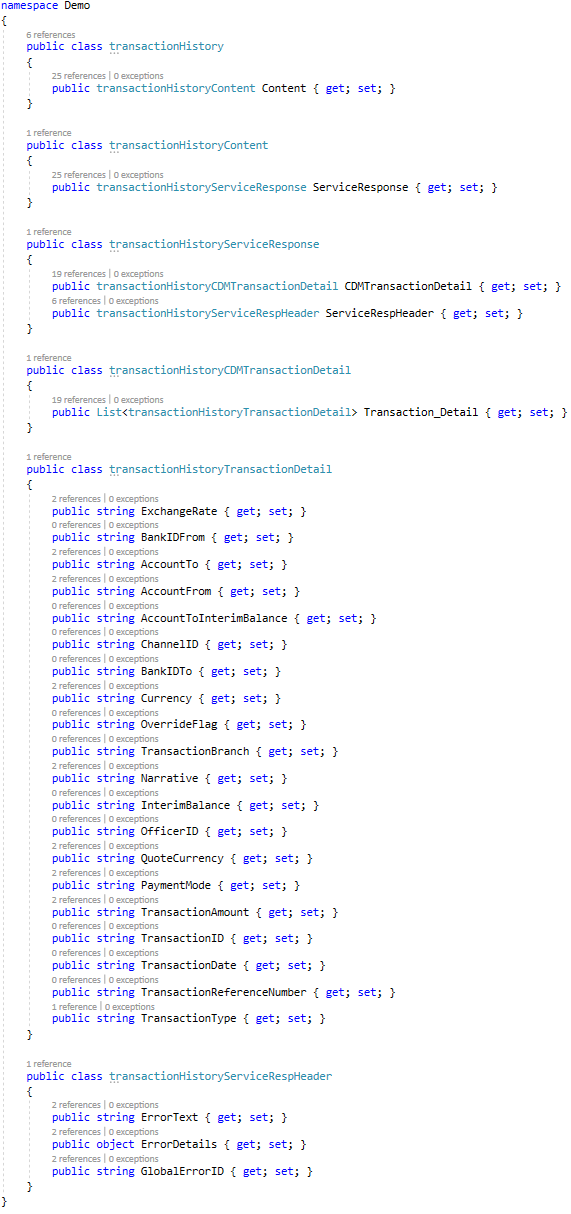
2. getTransactionHistory.aspx.cs
These 13 packages are required to be used.
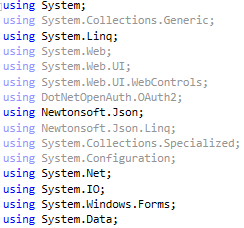
Code in Common
(1). Check if user id and password is inside session. When the user id and password is inside user session, it will automatically populate into the user id and pin textbox, so that the user need not manually type his user id and password repeatedly.
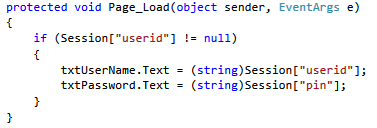
Step 2. Store details entered by the user. If user id, password, and OTP exist in session, user need not enter again (refer to common stuff).
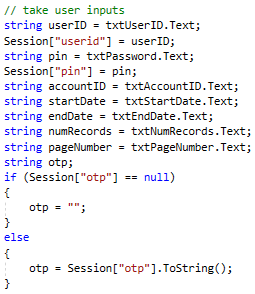
Step 3. Create URL which will be post to the server. User inputs need to be stored in the class created, and serialize into JSON format. In this function, only header is needed.
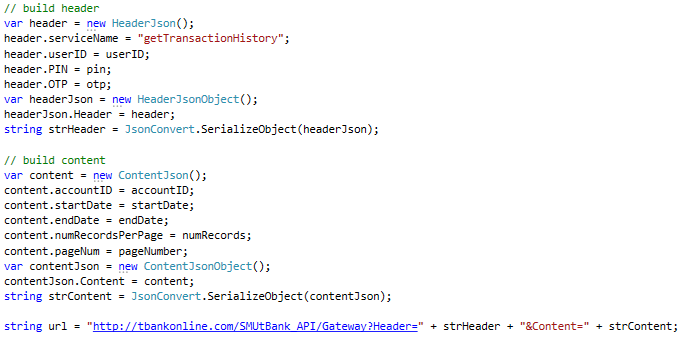
Step 4. Post to the server, and store response. URL is sent using web request function, and a response will be send back from the server. The response need to be deserialized into the ‘getTransactionHistory’ class.
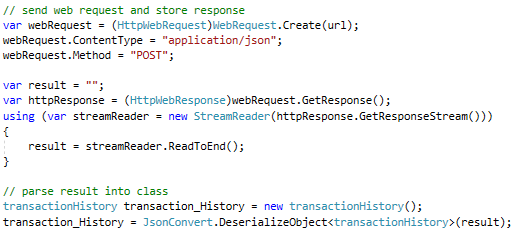
Step 5. Obtain error code. If error code is ‘010000’ which means invocation successful, populate attributes of the ‘getTransactionHistory’ class into the label. If error code is '010041', it means OTP has expired, and we will use the newOTP() function to prompt the user for the OTP again. Else, we will display the ErrorText and ErrorDetails.
The reference data API "getTransactionTypes" has been used as shown in the red box, and can be referred under Reference Data section.
The newOTP() function can be referred to under Common Stuff Section
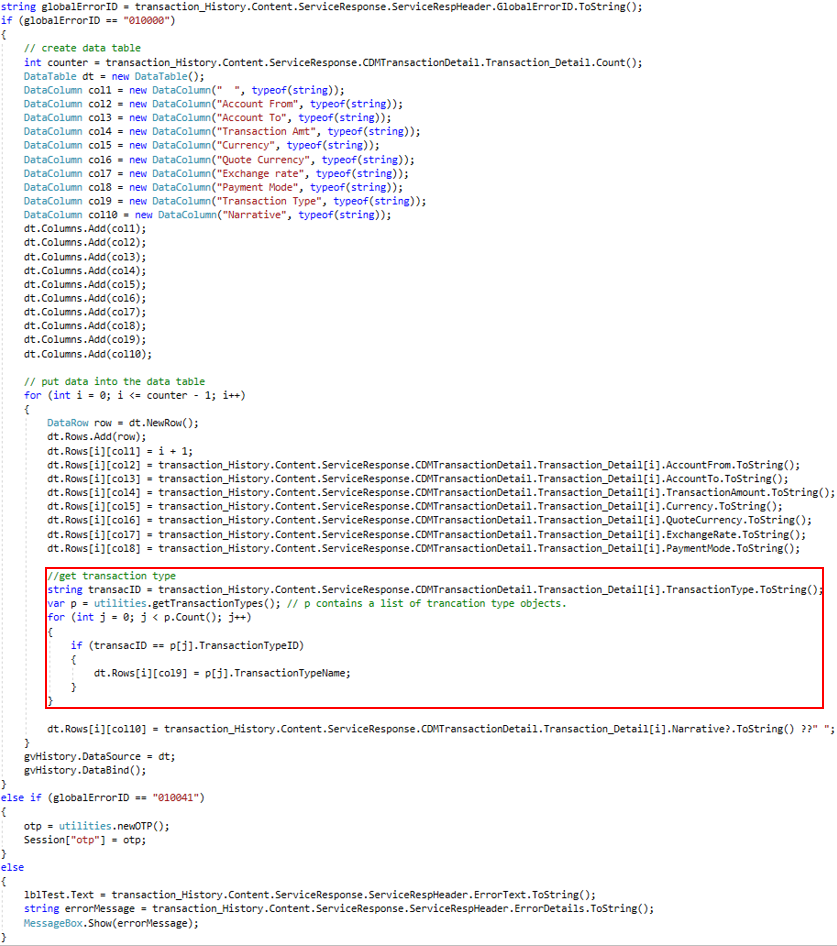
Overview of getTransactionHistory.cs
using System;
using System.Collections.Generic;
using System.Linq;
using System.Web;
using Newtonsoft.Json;
namespace Demo
{
public class transactionHistory
{
public transactionHistoryContent Content { get; set; }
}
public class transactionHistoryContent
{
public transactionHistoryServiceResponse ServiceResponse { get; set; }
}
public class transactionHistoryServiceResponse
{
public transactionHistoryCDMTransactionDetail CDMTransactionDetail { get; set; }
public transactionHistoryServiceRespHeader ServiceRespHeader { get; set; }
}
public class transactionHistoryCDMTransactionDetail
{
public List<transactionHistoryTransactionDetail> Transaction_Detail { get; set; }
}
public class transactionHistoryTransactionDetail
{
public string ExchangeRate { get; set; }
public string BankIDFrom { get; set; }
public string AccountTo { get; set; }
public string AccountFrom { get; set; }
public string AccountToInterimBalance { get; set; }
public string ChannelID { get; set; }
public string BankIDTo { get; set; }
public string Currency { get; set; }
public string OverrideFlag { get; set; }
public string TransactionBranch { get; set; }
public string Narrative { get; set; }
public string InterimBalance { get; set; }
public string OfficerID { get; set; }
public string QuoteCurrency { get; set; }
public string PaymentMode { get; set; }
public string TransactionAmount { get; set; }
public string TransactionID { get; set; }
public string TransactionDate { get; set; }
public string TransactionReferenceNumber { get; set; }
public string TransactionType { get; set; }
}
public class transactionHistoryServiceRespHeader
{
public string ErrorText { get; set; }
public object ErrorDetails { get; set; }
public string GlobalErrorID { get; set; }
}
}
Overview of getTransactionHistory.aspx.cs
using System;
using System.Collections.Generic;
using System.Linq;
using System.Web;
using System.Web.UI;
using System.Web.UI.WebControls;
using DotNetOpenAuth.OAuth2;
using Newtonsoft.Json;
using Newtonsoft.Json.Linq;
using System.Collections.Specialized;
using System.Configuration;
using System.Net;
using System.IO;
using System.Windows.Forms;
using System.Data;
namespace Demo
{
public partial class getTransactionHistory : System.Web.UI.Page
{
protected void Page_Load(object sender, EventArgs e)
{
if (Session["userid"] != null)
{
txtUserID.Text = (string)Session["userid"];
txtPassword.Text = (string)Session["pin"];
}
}
protected void btnSend_Click(object sender, EventArgs e)
{
try
{
// take user inputs
string userID = txtUserID.Text;
Session["userid"] = userID;
string pin = txtPassword.Text;
Session["pin"] = pin;
string accountID = txtAccountID.Text;
string startDate = txtStartDate.Text;
string endDate = txtEndDate.Text;
string numRecords = txtNumRecords.Text;
string pageNumber = txtPageNumber.Text;
string otp;
if (Session["otp"] == null)
{
otp = "";
}
else
{
otp = Session["otp"].ToString();
}
// build header
var header = new HeaderJson();
header.serviceName = "getTransactionHistory";
header.userID = userID;
header.PIN = pin;
header.OTP = otp;
var headerJson = new HeaderJsonObject();
headerJson.Header = header;
string strHeader = JsonConvert.SerializeObject(headerJson);
// build content
var content = new ContentJson();
content.accountID = accountID;
content.startDate = startDate;
content.endDate = endDate;
content.numRecordsPerPage = numRecords;
content.pageNum = pageNumber;
var contentJson = new ContentJsonObject();
contentJson.Content = content;
string strContent = JsonConvert.SerializeObject(contentJson);
string url = "http://tbankonline.com/SMUtBank_API/Gateway?Header=" + strHeader + "&Content=" + strContent;
// send web request and store response
var webRequest = (HttpWebRequest)WebRequest.Create(url);
webRequest.ContentType = "application/json";
webRequest.Method = "POST";
var result = "";
var httpResponse = (HttpWebResponse)webRequest.GetResponse();
using (var streamReader = new StreamReader(httpResponse.GetResponseStream()))
{
result = streamReader.ReadToEnd();
}
// parse result into class
transactionHistory transaction_History = new transactionHistory();
transaction_History = JsonConvert.DeserializeObject<transactionHistory>(result);
string globalErrorID = transaction_History.Content.ServiceResponse.ServiceRespHeader.GlobalErrorID.ToString();
if (globalErrorID == "010000")
{
// create data table
int counter = transaction_History.Content.ServiceResponse.CDMTransactionDetail.Transaction_Detail.Count();
DataTable dt = new DataTable();
DataColumn col1 = new DataColumn(" ", typeof(string));
DataColumn col2 = new DataColumn("Account From", typeof(string));
DataColumn col3 = new DataColumn("Account To", typeof(string));
DataColumn col4 = new DataColumn("Transaction Amt", typeof(string));
DataColumn col5 = new DataColumn("Currency", typeof(string));
DataColumn col6 = new DataColumn("Quote Currency", typeof(string));
DataColumn col7 = new DataColumn("Exchange rate", typeof(string));
DataColumn col8 = new DataColumn("Payment Mode", typeof(string));
DataColumn col9 = new DataColumn("Transaction Type", typeof(string));
DataColumn col10 = new DataColumn("Narrative", typeof(string));
dt.Columns.Add(col1);
dt.Columns.Add(col2);
dt.Columns.Add(col3);
dt.Columns.Add(col4);
dt.Columns.Add(col5);
dt.Columns.Add(col6);
dt.Columns.Add(col7);
dt.Columns.Add(col8);
dt.Columns.Add(col9);
dt.Columns.Add(col10);
// put data into the data table
for (int i = 0; i <= counter - 1; i++)
{
DataRow row = dt.NewRow();
dt.Rows.Add(row);
dt.Rows[i][col1] = i + 1;
dt.Rows[i][col2] = transaction_History.Content.ServiceResponse.CDMTransactionDetail.Transaction_Detail[i].AccountFrom.ToString();
dt.Rows[i][col3] = transaction_History.Content.ServiceResponse.CDMTransactionDetail.Transaction_Detail[i].AccountTo.ToString();
dt.Rows[i][col4] = transaction_History.Content.ServiceResponse.CDMTransactionDetail.Transaction_Detail[i].TransactionAmount.ToString();
dt.Rows[i][col5] = transaction_History.Content.ServiceResponse.CDMTransactionDetail.Transaction_Detail[i].Currency.ToString();
dt.Rows[i][col6] = transaction_History.Content.ServiceResponse.CDMTransactionDetail.Transaction_Detail[i].QuoteCurrency.ToString();
dt.Rows[i][col7] = transaction_History.Content.ServiceResponse.CDMTransactionDetail.Transaction_Detail[i].ExchangeRate.ToString();
dt.Rows[i][col8] = transaction_History.Content.ServiceResponse.CDMTransactionDetail.Transaction_Detail[i].PaymentMode.ToString();
//get transaction type
string transacID = transaction_History.Content.ServiceResponse.CDMTransactionDetail.Transaction_Detail[i].TransactionType.ToString();
var p = utilities.getTransactionTypes(); // p contains a list of trancation type objects.
for (int j = 0; j < p.Count(); j++)
{
if (transacID == p[j].TransactionTypeID)
{
dt.Rows[i][col9] = p[j].TransactionTypeName;
}
}
dt.Rows[i][col10] = transaction_History.Content.ServiceResponse.CDMTransactionDetail.Transaction_Detail[i].Narrative?.ToString() ??" ";
}
gvHistory.DataSource = dt;
gvHistory.DataBind();
}
else if (globalErrorID == "010041")
{
otp = utilities.newOTP();
Session["otp"] = otp;
}
else
{
lblTest.Text = transaction_History.Content.ServiceResponse.ServiceRespHeader.ErrorText.ToString();
string errorMessage = transaction_History.Content.ServiceResponse.ServiceRespHeader.ErrorDetails.ToString();
MessageBox.Show(errorMessage);
}
}
catch(Exception ex)
{
lblExceptionMsg.Text = ex.ToString();
}
}
Created with the Personal Edition of HelpNDoc: Full-featured multi-format Help generator